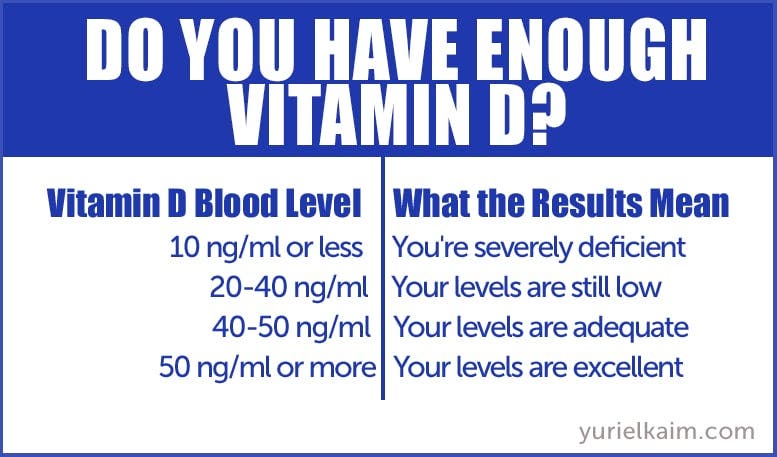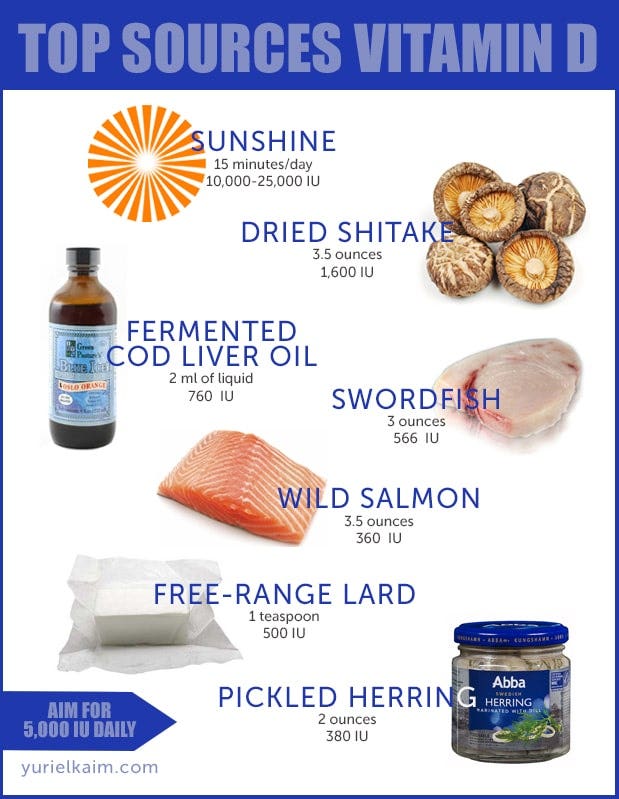6 Health Benefits Of Vitamin D & How Much You Really Need
Getting "occasional" sunshine isn't cutting it.
 getty
getty You've probably heard a lot about the benefits of Vitamin D.
Most people understand that Vitamin D is important, but there are still a lot of myths and misunderstandings floating around, the best sources of it, why your body needs it, and how much you need.
But Vitamin D may be one of the single most powerful nutrients you're not getting enough of.
Symptoms of Vitamin D Deficiency
Three out of 4 people are vitamin D-deficient. And an estimated 75 percent of the public is putting their health at risk by not ensuring their Vitamin D levels are up to par.
Research from The Archives of Internal Medicine clearly shows that only about 23 percent of people have adequate blood levels of vitamin D (based on U.S. research). Researchers also pointed out that deficiency is even more common among dark-skinned cultures like Latinos and African-Americans.
RELATED: 11 Signs Of Vitamin B12 Deficiency & What Happens When Your Vitamin B12 Is Low
Are you getting enough Vitamin D?

Symptoms of deficienty include:
- Bone loss
- Fatigue
- Bone and joint pain
- Stress fractures
- Muscle cramps
- Mood changes
Effects of Vitamin D Deficiency
There have been several massive studies that show low vitamin D levels are closely related to shortened longevity, and one's likelihood of developing some of the most common diseases: heart disease, diabetes, cancer.
The clear observation in studies is an obvious connection between adequate levels of Vitamin D and living a long, robust life.
A simple lab test and even simpler supplement can help ensure that healthy future you're after. Get a full course of blood work done by a doctor or functional diagnostic nutrition expert. Or, you can order an online test and send it into a lab for results.
You can also purchase an at-home test, which needs a single finger prick to help you determine your Vitamin D levels.
How Much Vitamin D Do You Need?
Depending on your age, your intake of Vitamin D will vary. It's also important to consult with your doctor, as they may recommend taking a specific dose. Some may also recommend taking a supplement, which ranges from 800 to 2000 IUs (International Unit).
According to the National Institutes of Health, each life stage has a recommended intake amount:
- Birth to 12 months: 10 mcg (400 IU)
- Children 1–13 years: 15 mcg (600 IU)
- Teens 14–18 years: 15 mcg (600 IU)
- Adults 19–70 years: 15 mcg (600 IU)
- Adults 71 years and older: 20 mcg (800 IU)
- Pregnant and breastfeeding women: 15 mcg (600 IU)
Many researchers and experts have been vocally arguing about the Vitamin D recommendations, which suggest 600-800 IUs per day. However, this is not enough Vitamin D to maintain healthy levels.
Most nutritional and medical professionals wonder: if this nutrient is so important and the deficiency is so common, why would we not automatically recommend more?
The basic answer behind the current low Vitamin D recommendations is ultimately because everyone's case is different. Though most people across the board are deficient, how much Vitamin D individuals get daily should be based off of individual blood levels, and not off of national recommendations.
Just one more reason to get your lab work done — to know how much Vitamin D you need, you must know your personal levels.
Though we can tolerate a huge amount of Vitamin D, there are still dangers of getting too much. Upper limits for an adult's vitamin D intake are likely around 10,000 to 40,000 IUs per day, or a blood level of 500–600 nmol/L.
Sources of Vitamin D
Some doctors and nutritionists will claim that common foods like milk and orange juice are supplemented with enough vitamin D to help prevent deficiency. Yet, deficiency is still the norm for most populations.
When you look at lists of what foods have vitamin D in them, the foods are pretty unusual and the amount they have is lacking comparatively.

The top sources of Vitamin D include:
- Sunshine
- Dried shiitake
- Fermented cod liver oil
- Swordfish
- Wild salmon
- Free-range large
- Pickled herring
RELATED: 3 Vitamins & Supplements To Choose For Optimal Health
Keep in mind that daily sunshine, supplementation, and food sources are all important ways to maintain balanced Vitamin D levels. Mindful daily supplementation (and sun whenever possible) is your best strategy to prevent deficiency and maintain adequate levels.
This small, but extremely vital habit, is massively important for long-term health and well-being.
6 Health Benefits of Vitamin D
1. Vitamin D helps protect against cancer.
Researchers have known for a while that vitamin D, because of its variety of effects on our cells, can fight off the development of cancer before it grows.
Remember, vitamin D can actually switch off, and on certain genes causes cell growth in certain areas, working synergistically with other nutrients in the body. All of these are reasons why this nutrient is thought to be a potent cancer prevention tool.
One study found that people had a 17 percent reduced rate of cancer appearing in the first place from having adequate Vitamin D levels. Also, for those who already developed cancer, higher vitamin D levels meant higher rates of survival. This was especially true for people with digestive cancers (stomach and colon cancer).
For every 25 nmol/L higher a person's blood level of vitamin D was, patients saw a 2 percent% drop in total cancer death and a 45 percent drop in cancers of the bowels, meaning vitamin D is one of the most powerful protections we have against cancer development and cancer survival.
2. Vitamin D can boost athletic performance.
What do you know about the Mexico City Summer Olympics in 1968? Probably not a lot, but this particular Olympic year had an unusually high amount of world records broken.
What does that fact have to do with Vitamin D? Altitude. Mexico City sits at a very high altitude (2,300 meters above sea level). It's been theorized that some of the great athletic feats of 1968 weren't just made possible by air quality, but were also a result of higher Vitamin D levels in athletes who'd arrived early to train and acclimatize. Since they were living at higher altitudes, they were closer to the sun–the single purest source of Vitamin D.
Vitamin D binds to muscle cells, and some studies have also shown a small but distinct correlation between heightened athletic performance, including an increased ability to run, jump and build muscular power. Additional studies have also shown the reverse: that low Vitamin D levels can actually slow athletic ability.
Anyone with a vested interested in maintaining or increasing their muscle mass should also know that Vitamin D can play a large part in preventing the loss of muscle tissue.
3. Vitamin D is essential for the immune system.
Once researchers began discovering the importance of vitamin D to bone health, they quickly noticed a trend with enhanced immunity. Before antibiotics were developed, Vitamin D was a go-to treatment to treat tuberculosis patients.
Along with muscle, bone and skin cells, Vitamin D also binds with immune cells to boost defense against foreign substances in the body.
Those who are already vitamin D-deficient can boost their ability to fight off colds and sicknesses by upping their levels. This immune protection is especially seen in cases of auto-immune disease like Multiple Sclerosis, where having high vitamin D levels and living in more sun-exposed places is one of the top prevention strategies.
So, there are a couple of take-aways from this important information.
First, you'll want to maintain high vitamin D levels to ward off sicknesses and some auto-immune diseases. Secondly, reach for some vitamin D next time you fall victim to a common cold or flu.
In both minor and major disease, Vitamin D can play a huge role in preventing illness and supporting recovery.
4. Vitamin D strengthens bones.
While calcium and phosphorus are other great sources for providing your bones with enough nutrients, having enough Vitamin D in your diet is essential as it aids your intestines in absorbing that calcium from food.
This calcium would otherwise be excreted through the kidneys.
Having a deficiency, unfortunately, can cause a softening of the bones in adults, and rickets in children, which is a bone condition.
In fact, over 53 million people in the U.S. have sought treatment for osteoporosis, or are at high risk from lack of Vitamin D, with the disease being one of the main causes of broken or fractured bones in elderly people. According to the Mayo Clinic, this occurs "when the cycle of new bone creation and old bone loss becomes unbalanced and more bone is lost than created."
5. Vitamin D promotes weight loss and reduces risk of heart disease.
Low levels of Vitamin D can lead to obesity, meaning having the proper amount of Vitamin D in your daily in take can help you lose weight.
One study from 2009 found a link between obesity and low calcium levels in overweight women. Those who took a daily dose of Vitamin D and calcium found more success with weight loss than those who took the placebo supplement. Researchers determined that a combination of calcium and Vitamin D can suppress appetite.
Another 2009 study determined that overweight people who took a Vitamin D supplement decreased their risk of developing heart disease. These researchers found that Vitamin D improved "several cardiovascular disease risk markers in overweight subjects with inadequate vitamin D status participating in a weight-reduction program."
6. Vitamin D positively affects other areas of the body.
Parathyroid, bone, skin, kidney, colon, blood cells, Pituitary gland, ovaries — there are plenty more organs and bodily functions that vitamin D is responsible for affecting.
The research on vitamin D is still expanding, which means the list is ever-growing. We still don't have an exhaustive understanding of all Vitamin D does for a body.
Though Vitamin D has a massive and complex effect on the body, the reality is simple: if you want to reverse disease, improve your energy, fight the aging process, or just keep a healthy functioning body running well, healthy levels of this Vitamin are essential.
Yuri Elkaim is a Registered Holistic Nutritionist and author of the NYTimes Best-selling book,"The All-Day Energy Diet," as well as "The All-Day Fat-Burning Diet."
